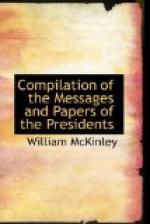The revolution which began in 1868 lasted for ten years despite the strenuous efforts of the successive peninsular governments to suppress it. Then as now the Government of the United States testified its grave concern and offered its aid to put an end to bloodshed in Cuba. The overtures made by General Grant were refused and the war dragged on, entailing great loss of life and treasure and increased injury to American interests, besides throwing enhanced burdens of neutrality upon this Government. In 1878 peace was brought about by the truce of Zanjon, obtained by negotiations between the Spanish commander, Martinez de Campos, and the insurgent leaders.
The present insurrection broke out in February, 1895. It is not my purpose at this time to recall its remarkable increase or to characterize its tenacious resistance against the enormous forces massed against it by Spain. The revolt and the efforts to subdue it carried destruction to every quarter of the island, developing wide proportions and defying the efforts of Spain for its suppression. The civilized code of war has been disregarded, no less so by the Spaniards than by the Cubans.
The existing conditions can not but fill this Government and the American people with the gravest apprehension. There is no desire on the part of our people to profit by the misfortunes of Spain. We have only the desire to see the Cubans prosperous and contented, enjoying that measure of self-control which is the inalienable right of man, protected in their right to reap the benefit of the exhaustless treasures of their country.
The offer made by my predecessor in April, 1896, tendering the friendly offices of this Government, failed. Any mediation on our part was not accepted. In brief, the answer read: “There is no effectual way to pacify Cuba unless it begins with the actual submission of the rebels to the mother country.” Then only could Spain act in the promised direction, of her own motion and after her own plans.
The cruel policy of concentration was initiated February 16, 1896. The productive districts controlled by the Spanish armies were depopulated. The agricultural inhabitants were herded in and about the garrison towns, their lands laid waste and their dwellings destroyed. This policy the late cabinet of Spain justified as a necessary measure of war and as a means of cutting off supplies from the insurgents. It has utterly failed as a war measure. It was not civilized warfare. It was extermination.
Against this abuse of the rights of war I have felt constrained on repeated occasions to enter the firm and earnest protest of this Government. There was much of public condemnation of the treatment of American citizens by alleged illegal arrests and long imprisonment awaiting trial or pending protracted judicial proceedings. I felt it my first duty to make instant demand for the release or speedy trial of all American citizens under arrest. Before the change of the Spanish cabinet in October last twenty-two prisoners, citizens of the United States, had been given their freedom.




